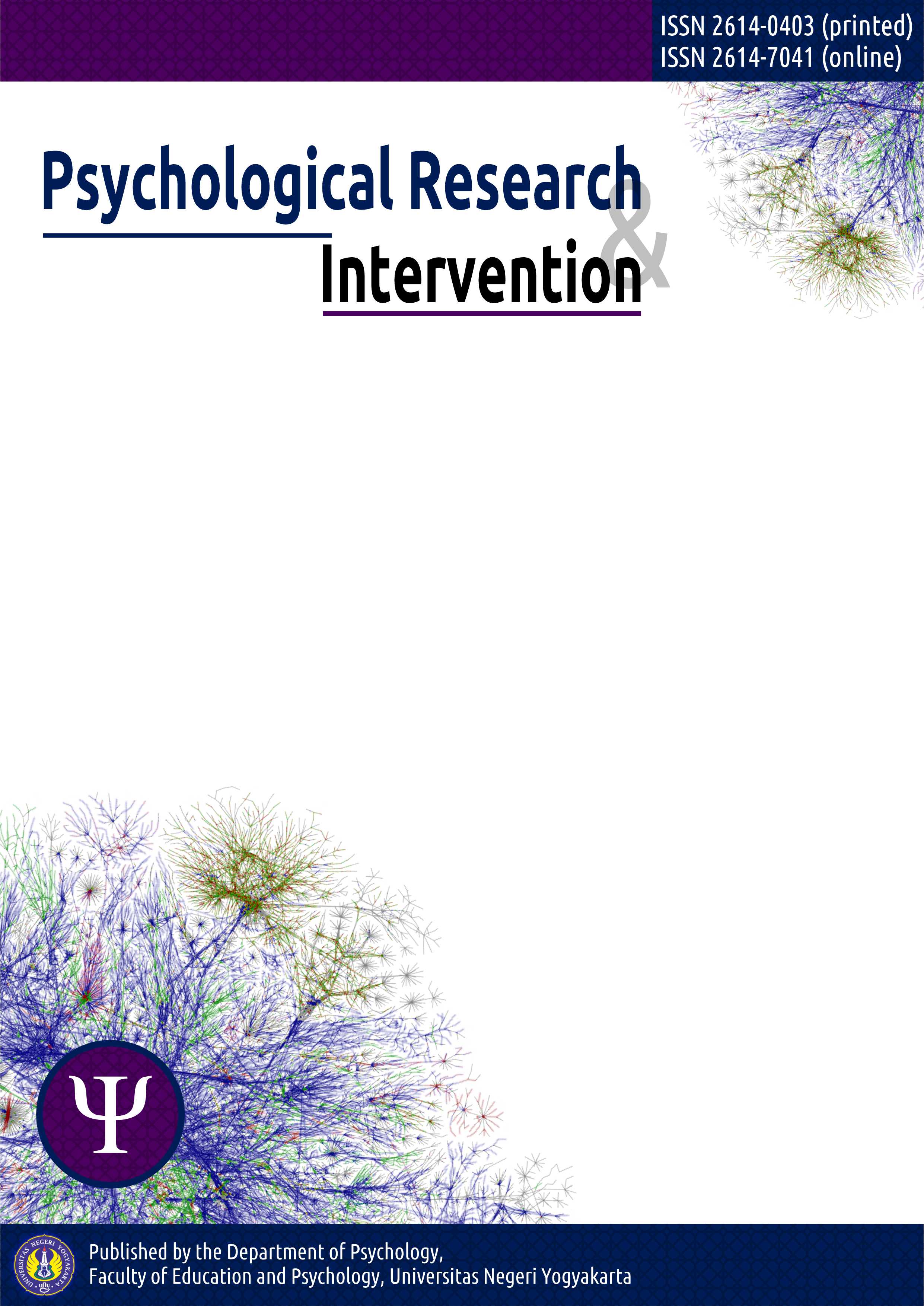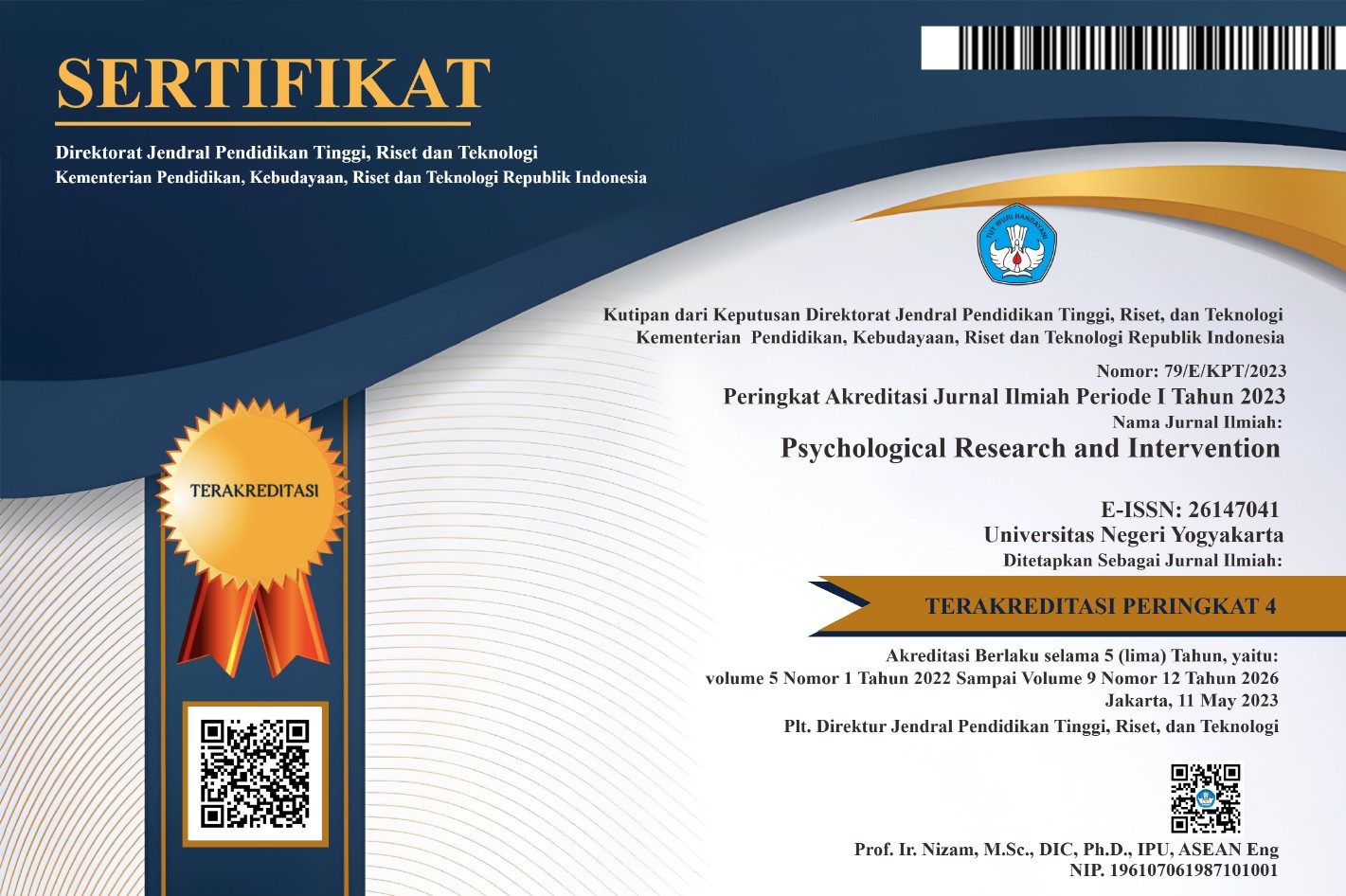Application of stepping stones triple-P on parents of intellectually disabled adolescent with emotional and behavioral problems
DOI:
https://doi.org/10.21831/pri.v5i2.53891Abstract
This study was conducted to determine the effectiveness of the Stepping Stones Triple-P (SSTP) intervention in a family of teenagers with moderate intellectual disability with emotional and behavioral problems. This intervention program aims to help prevent emotional and behavioral problems in children with moderate intellectual disability through positive parenting training. This intervention program is carried out in 9 sessions; each session lasts ± 60 – 120 minutes at each meeting and lasts ± three weeks, carried out online through the Zoom meeting. The intervention method in this study was implemented through lectures, discussions, worksheets, and roleplay methods. Children's behavior problems were measured using the Child Behavior Checklist (CBCL) and a diary of children's behavior filled in by parents during pre-post intervention and follow-up. The Parenting Sense of Competence Scale (PSOC) measures parents' perceptions of competence in parenting practices. This study's participants were the parents (mother) of a boy aged 16 years 4 months (N) diagnosed with moderate intellectual disability with emotional and behavioral problems. The results of this study indicate that the SSTP intervention program effectively reduces the emotional and behavioral problems shown by N by increasing the knowledge and skills of parents in implementing positive parenting strategies. In this study, there were positive changes in parenting practices applied by mothers to children, such as forming a harmonious and warm relationship between mothers and children. The positive changes achieved by mothers in implementing positive parenting also influenced the change in problematic behavior in children (N) to decrease and become more positive.
References
Adams, D., & Oliver, C. (2011). The expression and assessment of emotions and internal states in individuals with severe or profound intellectual disabilities. Clinical Psychology Review, 31(3), 293–306. https://doi.org/10.1016/j.cpr.2011.01.003
Adibsereshki, N., Shaydaei, M., & Movallali, G. (2016). The effectiveness of emotional intelligence training on the adaptive behaviors of students with intellectual disability. International Journal of Developmental Disabilities, 62(4), 245–252. https://doi.org/10.1179/2047387715Y.0000000014
Aery, A., Hodges, J., & Day, J. (2018). The Effect of School-Based Stepping Stones Triple P on Child and Parent Outcomes. 139(Uipsur 2017), 338–345. https://doi.org/10.2991/uipsur-17.2018.50
American Association on Intellectual and Development Disabilities (AAIDD). (2022). Defining Criteria for Intellectual Disability. https://www.aaidd.org/intellectual-disability/definition
American Psychiatric Association. (2013). Diagnostic and statistical manual of mental disorders: DSM-5. American psychiatric association.
Baurain, C., Nader-Grosbois, N., & Dionne, C. (2013). Socio-emotional regulation in children with intellectual disability and typically developing children, and teachers' perceptions of their social adjustment. Research in Developmental Disabilities, 34(9), 2774–2787. https://doi.org/10.1016/j.ridd.2013.03.022
Bor, W., Sanders, M. R., & Markie-Dadds, C. (2002). The effects of the triple P-positive parenting program on preschool children with co-occurring disruptive behavior and attentional/hyperactive difficulties. Journal of Abnormal Child Psychology, 30(6), 571–587. https://doi.org/10.1023/A:1020807613155
Courtenay, K., & Perera, B. (2020). COVID-19 and people with intellectual disability: Impacts of a pandemic. Irish Journal of Psychological Medicine, 37(3), 231–236. https://doi.org/10.1017/ipm.2020.45
Einfeld, S. L., Ellis, L. A., & Emerson, E. (2011). Comorbidity of intellectual disability and mental disorder in children and adolescents: A systematic review. Journal of Intellectual and Developmental Disability, 36(2), 137–143. https://doi.org/10.1080/13668250.2011.572548
Farris, O., Royston, R., Absoud, M., Ambler, G., Barnes, J., Hunter, R., Kyriakopoulos, M., Oulton, K., Paliokosta, E., Panca, M., Paulauskaite, L., Poppe, M., Ricciardi, F., Sharma, A., Slonims, V., Summerson, U., Sutcliffe, A., Thomas, M., & Hassiotis, A. (2020). Clinical and cost effectiveness of a parent mediated intervention to reduce challenging behaviour in pre-schoolers with moderate to severe intellectual disability (EPICC-ID) study protocol: A multi-centre, parallel-group randomised controlled trial. BMC Psychiatry, 20(1), 1–12. https://doi.org/10.1186/s12888-020-2451-6
Gravetter, Jf., & Forzano, Bl. (2018). Research Methods for the Behavior Behavioral Sciences (6 ed). Cengage Learning, inc.
Hinton, S., Sheffield, J., Sanders, M. R., & Sofronoff, K. (2017). A randomized controlled trial of a telehealth parenting intervention: A mixed-disability trial. Research in Developmental Disabilities, 65(March), 74–85. https://doi.org/10.1016/j.ridd.2017.04.005
Hodapp, R. M., & Dykens, E. M. (2009). Intellectual disabilities and child psychiatry: Looking to the future. Journal of Child Psychology and Psychiatry and Allied Disciplines, 50(1–2), 99–107. https://doi.org/10.1111/j.1469-7610.2008.02038.x
Lee, K., Cascella, M., & Marwaha, R. (2022). Intellectual Disability. StatPearls Publishing, Treasure Island (FL). http://europepmc.org/books/NBK547654
Lee, Y., Keown, L. J., & Sanders, M. R. (2022). The effectiveness of the Stepping Stones Triple P Seminars for Korean families of a child with a developmental disability. Heliyon, 8(November 2021), e09686. https://doi.org/10.1016/j.heliyon.2022.e09686
Mash, E. J., & Wolfe, D. A. (2016). Abnormal Child Psychology. In Abnormal Child and Adolescent Psychology (Sixth Edit). Cengage Learning.
Mazzucchelli, T. G., & Sanders, M. R. (2012). Stepping Stones Triple P: a population approach to the promotion of competent parenting of children with disability. In Parenting Research and Practice Monograph (Vol. 2, Issue 2). files/100/Mazzucchelli and Sanders - 2012 - Stepping Stones Triple P a population approach to.pdf
Nida, D. A. D. T. P. P. (2017). Efektivitas Penerapan Prinsip-Prinsip Standard Positive Parenting Program (Triple-P) untuk Menurunkan Perilaku Mencuri pada Anak. Tesis. Depok: Universitas Indonesia.
Ogundele, M. O. (2018). Behavioural and emotional disorders in childhood: A brief overview for paediatricians. World Journal of Clinical Pediatrics, 7(1), 9–26. https://doi.org/10.5409/wjcp.v7.i1.9
Platt, J. M., Keyes, K. M., McLaughlin, K. A., & Kaufman, A. S. (2019). Intellectual disability and mental disorders in a US population representative sample of adolescents. Psychological Medicine, 49(6), 952–961. https://doi.org/10.1017/S0033291718001605
Roberts, C., Mazzucchelli, T., Studman, L., & Sanders, M. R. (2006). Behavioral family intervention for children with developmental disabilities and behavioral problems. Journal of Clinical Child and Adolescent Psychology, 35(2), 180–193. https://doi.org/10.1207/s15374424jccp3502_2
Ruane, A., Carr, A., & Moffat, V. (2019). A qualitative study of parents' and facilitators' experiences of Group Stepping Stones Triple P for parents of children with disabilities. Clinical Child Psychology and Psychiatry, 24(4), 694–711. https://doi.org/10.1177/1359104518807265
Ruane, Ai., & Carr, A. (2019). Systematic Review and Meta-analysis of Stepping Stones Triple P for Parents of Children with Disabilities. Family Process, 58(1), 232–246. https://doi.org/10.1111/famp.12352
Sanders, M. R., Turner, K. M. T., & Metzler, C. W. (2019). Applying Self-Regulation Principles in the Delivery of Parenting Interventions. Clinical Child and Family Psychology Review, 22(1), 24–42. https://doi.org/10.1007/s10567-019-00287-z
Tellegen, C. L., & Sanders, M. R. (2013). Stepping Stones Triple P-Positive Parenting Program for children with disability: A systematic review and meta-analysis. Research in Developmental Disabilities, 34(5), 1556–1571. https://doi.org/10.1016/j.ridd.2013.01.022
Totsika, V., Hastings, R. P., Vagenas, D., & Emerson, E. (2014). Parenting and the behavior problems of young children with an intellectual disability: Concurrent and longitudinal relationships in a population-based study. American Journal on Intellectual and Developmental Disabilities, 119(5), 422–435. https://doi.org/10.1352/1944-7558-119.5.422












